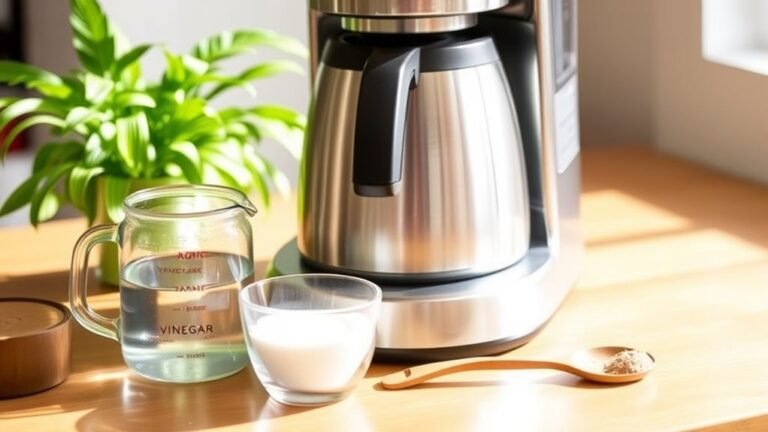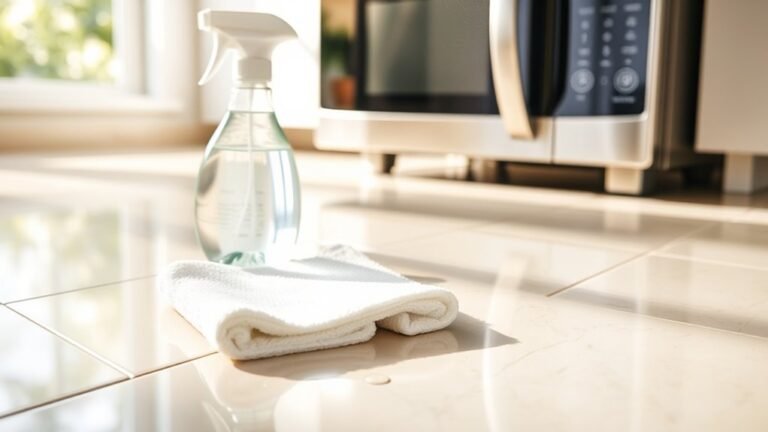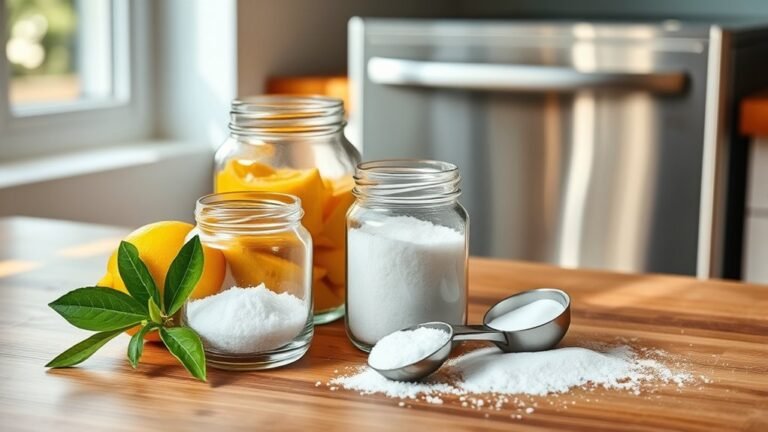How to Clean and Deodorize Your Laundry
To clean and deodorize your laundry, start by pre-treating stains to break down odor-causing bacteria. Choose detergents with enzymes and oxygen boosters tailored to your fabric type. Add natural deodorizers like baking soda or vinegar during washing to neutralize smells and soften fabric. Wash on appropriate cycles without overloading and dry thoroughly to prevent mildew. Regular machine maintenance also guarantees freshness. Following these steps will set you up for consistently fresh, odor-free laundry.
Understanding Common Laundry Odors
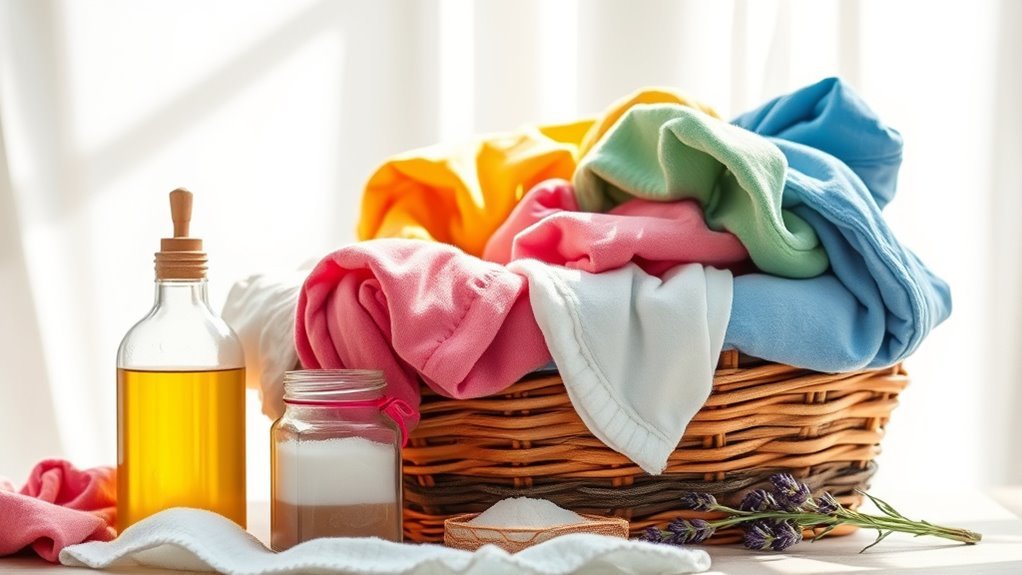
Although laundry odors can vary widely, most unpleasant smells stem from bacteria, mildew, or detergent buildup trapped in your clothes or washing machine. You should recognize these common causes to effectively tackle odors. Bacteria thrive on sweat and body oils, especially in synthetic fabric types like polyester and nylon, which retain moisture longer. Mildew develops when damp laundry sits too long, particularly on cotton and other natural fibers that absorb water deeply. Detergent buildup occurs when excess soap isn’t fully rinsed, leaving residues that trap odors. Understanding how different fabric types interact with moisture and detergents helps you choose proper washing methods. Taking control of these factors frees you from persistent smells and guarantees your laundry stays fresh and clean every time.
Pre-Treating Stubborn Smells and Stains
Three key steps can help you effectively pre-treat stubborn smells and stains before washing. First, identify the type of stain to select an appropriate stain removal method—protein-based stains like sweat respond well to enzymatic treatments, while oil-based stains require a degreaser. Second, apply a targeted pre-treatment product directly to the affected area, gently working it in to break down both odor-causing bacteria and stain residues. Third, allow the pre-treatment to sit for at least 10-15 minutes to maximize odor neutralization and stain dissolution. This methodical approach guarantees you tackle the root cause of odors and marks, freeing your fabrics from persistent problems and preparing them for thorough cleaning during the wash cycle. Pre-treating properly saves time and preserves your laundry’s freshness and appearance.
Choosing the Right Detergent for Odor Removal
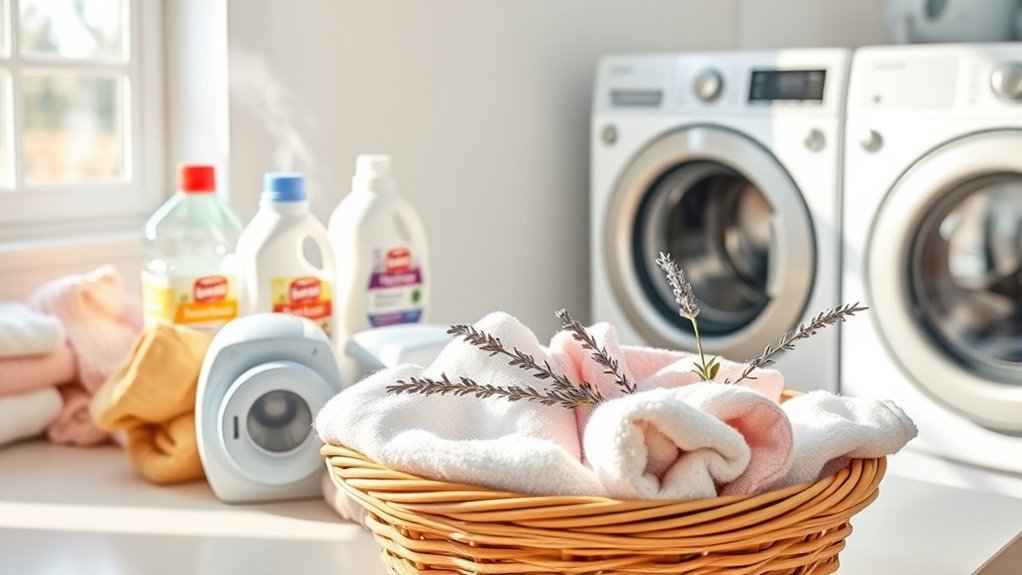
When selecting a detergent for odor removal, focus on ingredients like enzymes and activated oxygen, which break down odor-causing molecules effectively. Different types of odor removers, such as those formulated for sportswear or heavy-duty cleaning, target specific smells. Understanding these options helps you choose a detergent that matches the intensity and type of odor you need to eliminate.
Detergent Ingredients for Odors
Because odors can be stubborn and deeply embedded in fabrics, selecting a detergent with the right ingredients is essential for effective odor removal. Focus on detergent components like enzymes and surfactants, which break down and lift odor-causing molecules from fibers. Look for formulations containing oxygen-based bleach or activated oxygen, as these oxidize and neutralize stubborn smells without harsh chemicals. Additionally, consider detergents with antimicrobial agents to inhibit bacterial growth, a common source of persistent odors. When choosing scent profiles, opt for light, natural fragrances that mask odors without overwhelming your senses or causing irritation. By understanding these detergent components and scent profiles, you’ll confidently select products that not only clean but also refresh your laundry, giving you the freedom to wear your clothes odor-free and fresh every day.
Types of Odor Removers
Understanding the key ingredients in detergents sets the stage for selecting the right type of odor remover for your laundry needs. You’ll find that odor removers typically fall into two categories: enzyme boosters and odor neutralizers. Enzyme boosters break down organic matter causing smells, making them ideal for sweat or food stains. Odor neutralizers, on the other hand, chemically target and eliminate odor molecules, perfect for persistent or synthetic odors. When choosing a detergent, consider the source of the odor and your fabric type. Some formulations combine both enzyme boosters and odor neutralizers for thorough odor control. By selecting detergents with these ingredients, you guarantee your laundry emerges fresh, allowing you the freedom to wear your clothes confidently without lingering smells.
Using Natural Deodorizers in Laundry
You can enhance your laundry’s freshness by incorporating natural deodorizers like baking soda, which neutralizes odors effectively. Adding a few drops of essential oils not only masks unpleasant smells but also leaves a subtle, pleasant scent. Additionally, white vinegar acts as a powerful deodorizer and fabric softener when used during the rinse cycle.
Benefits of Baking Soda
While commercial detergents often contain synthetic fragrances and chemicals, baking soda offers a natural alternative that effectively neutralizes odors and softens fabrics. By adding baking soda to your laundry, you harness its ability to balance pH levels, enhancing cleaning power without harsh additives. This means fresher, cleaner clothes with fewer irritants.
Here’s a quick look at baking soda’s laundry benefits:
| Benefit | How It Works | Result |
|---|---|---|
| Odor Neutralizer | Neutralizes acids and bases | Removes stubborn smells |
| Fabric Softener | Softens water, reduces stiffness | Clothes feel softer |
| Stain Booster | Enhances detergent’s effectiveness | Improved stain removal |
| pH Balancer | Maintains ideal wash pH | Protects fibers |
| Cost-Effective | Inexpensive and widely available | Saves money |
Using baking soda empowers you with a natural, effective laundry solution.
Essential Oils Usage
Essential oils offer a natural way to enhance your laundry’s freshness without relying on synthetic fragrances. To use them effectively, add 5-10 drops of your preferred essential oil blends directly to the wash cycle or dilute them in a cup of water and add during the rinse. You can create custom scent combinations by mixing oils like lavender and eucalyptus or lemon and peppermint, tailoring the aroma to your preference. Avoid applying oils directly onto fabric to prevent staining. Essential oils not only deodorize but also provide antimicrobial benefits, helping maintain laundry hygiene. Experiment with various scent combinations to find what best suits your lifestyle, giving you freedom from artificial scents while enjoying fresh, clean clothes after every wash.
Vinegar as Deodorizer
Natural substances like essential oils can boost your laundry’s freshness, but vinegar stands out as a powerful deodorizer that tackles odors and residue effectively. You’ll appreciate vinegar benefits such as neutralizing smells, softening fabrics, and breaking down detergent buildup. To use vinegar as a deodorizer:
- Add 1/2 to 1 cup of white distilled vinegar to the rinse cycle.
- Avoid mixing vinegar with bleach to prevent harmful fumes.
- For those sensitive to vinegar’s scent, try vinegar alternatives like baking soda or lemon juice.
Using vinegar gives you freedom from harsh chemicals while maintaining clean, fresh laundry. It’s a simple, natural solution that fits seamlessly into your routine, ensuring your clothes smell great without compromising your values or the environment.
The Role of Vinegar and Baking Soda
Many laundry routines benefit from incorporating vinegar and baking soda due to their powerful cleaning and deodorizing properties. Vinegar benefits include breaking down residues and neutralizing odors, making it ideal for revitalizing your laundry naturally. Baking soda acts as a gentle abrasive and pH adjuster, enhancing stain removal and softening fabrics without harsh chemicals. When you add half a cup of vinegar during the rinse cycle, it helps eliminate detergent buildup and restores fabric brightness. Baking soda, added with your detergent, boosts washing power and controls odor-causing bacteria. Together, these ingredients complement each other effectively, providing a thorough clean while preserving fabric integrity. Using vinegar and baking soda empowers you to maintain fresh, clean laundry with simple, eco-friendly solutions that free you from reliance on synthetic additives.
Washing Techniques for Maximum Freshness
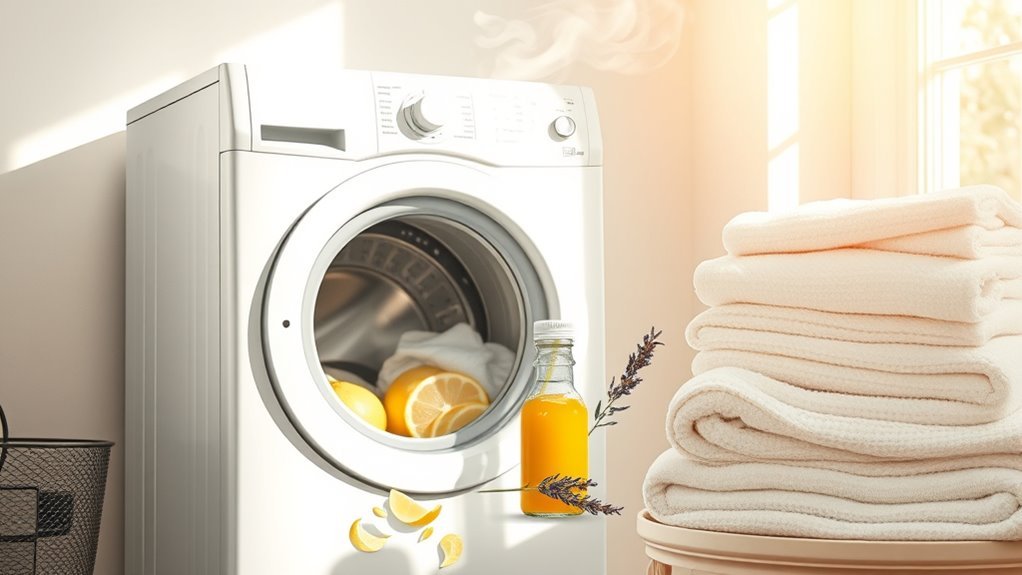
Although using the right products is important, mastering effective washing techniques plays a crucial role in keeping your laundry fresh. To maximize freshness, you need to tailor your approach based on fabric types and laundry cycles.
Mastering washing techniques, beyond just products, is key to keeping laundry fresh and fabric-friendly.
- Sort by fabric types: Group items like cottons, synthetics, and delicates separately. This prevents damage and guarantees ideal cleaning settings.
- Choose the appropriate laundry cycles: Use heavy-duty cycles for sturdy fabrics and gentle cycles for delicate ones to preserve fabric integrity and cleanliness.
- Avoid overloading the machine: Overcrowding reduces water and detergent efficiency, hindering odor removal and dirt extraction.
How to Properly Dry Clothes to Prevent Odors
If you want to prevent odors from developing, drying your clothes properly is just as important as washing them correctly. Proper drying eliminates moisture that bacteria and mold need to thrive, ensuring your laundry stays fresh. Start by removing your clothes promptly from the washer to avoid excess dampness. Use a dryer on the appropriate heat setting or, if air-drying, choose a well-ventilated space with good airflow. Avoid overcrowding the drying area; this allows moisture to escape efficiently. Pay close attention to moisture control—clothes should be completely dry before storing. Any residual dampness invites unpleasant smells and mildew growth. By mastering proper drying techniques, you’ll maintain odor-free laundry and enjoy the freedom of fresh, clean clothes every day.
Maintaining Your Washing Machine for Clean Laundry
Once your clothes are properly dried to prevent odors, it’s important to focus on the appliance that handles the washing itself. Proper machine maintenance guarantees your washer stays efficient and your laundry fresh. Follow these steps for effective washer cleaning:
Maintaining your washer ensures efficiency and fresh laundry after properly drying your clothes to prevent odors.
- Run a monthly hot water cycle with white vinegar or a commercial washing machine cleaner to dissolve residue and kill bacteria.
- Wipe down the door seal, detergent drawer, and drum regularly to remove mold and detergent buildup.
- Leave the washer door open after each use to allow air circulation and prevent moisture accumulation.
Tips for Refreshing Clothes Between Washes
How can you keep your clothes smelling fresh and looking neat without a full wash every time? Start by understanding fabric types; natural fibers like cotton breathe better and can be refreshed by airing out, while synthetics may need more targeted odor control. Use a fabric refresher spray or lightly mist clothes with a mixture of water and a few drops of essential oil. Proper clothing storage is crucial—store items in a well-ventilated, dry space to prevent mildew and odors. For delicate fabrics, consider steaming to remove wrinkles and odors without washing. Rotate your wardrobe to allow fabrics to rest between uses. These methods not only save water and energy but also extend the life of your garments, giving you more freedom to enjoy your clothes without frequent laundering.
Frequently Asked Questions
Can Essential Oils Help in Deodorizing Laundry Effectively?
Yes, you can effectively deodorize laundry using essential oil blends. These oils act as natural laundry scent boosters, adding a fresh aroma while combating odors. To use them, add a few drops of your chosen essential oil blend to your washing machine’s rinse cycle or mix with baking soda for added freshness. This method lets you enjoy clean-smelling clothes without relying on synthetic fragrances, giving you freedom from harsh chemicals.
How Do I Remove Odors From Non-Washable Fabrics?
To remove odors from non-washable fabrics, start by using fabric freshening sprays designed specifically for delicate materials. You can also try non washable fabric techniques like lightly misting the item and letting it air out to neutralize odors. Another effective method is placing the fabric in a sealed bag with baking soda overnight to absorb smells. These approaches keep your fabrics fresh without risking damage, giving you freedom to maintain freshness easily.
Are There Specific Detergents for Sensitive Skin and Odor Control?
Yes, you can find detergents designed specifically for sensitive skin that are also effective at odor control. These detergents are usually fragrance free and formulated to minimize irritation while neutralizing odors. When choosing one, look for labels stating “hypoallergenic” or “dermatologist tested.” This way, you’re protecting your skin’s freedom from harsh chemicals without sacrificing freshness. Always follow the instructions for best results and avoid fabric softeners that may cause sensitivity.
What Temperature Is Best for Killing Odor-Causing Bacteria?
Like a blazing sun scorching away morning dew, hot water at around 140°F (60°C) is your best ally against odor-causing bacteria. At lower temperatures, bacteria survival rates increase, making odors linger. You’ll want to balance fabric care with effective cleaning, so check labels first. Using hot water systematically guarantees a thorough kill-off, giving you fresh, liberating laundry that feels as clean as it smells, freeing you from stubborn odors.
How Often Should I Clean My Laundry Hamper to Prevent Smells?
You should clean your laundry hamper at least once every two weeks to maintain odor prevention. Regularly wiping it down with a mild detergent or a vinegar-water solution helps eliminate bacteria and mildew that cause smells. If you notice persistent odors, clean it more often and let it dry completely before use. Keeping your laundry hamper fresh guarantees your clothes stay cleaner and your space feels more inviting.


